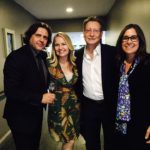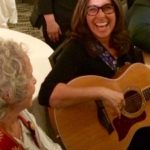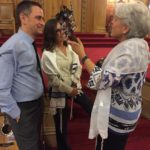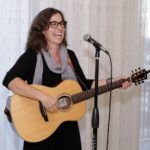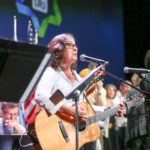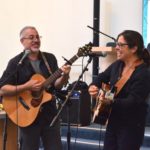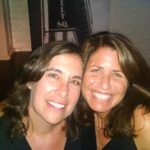On Simchat Torah, Nothing But Joy
October 7th, 2012 by Julie Silver
Years ago I served as Cantorial Soloist for a beautiful, loving congregation in Southern California. What I enjoyed most about this job was officiating B’nai Mitzvah. I was blessed to witness these milestones for seven years and in that time learned much from the students, their families and my Rabbi.
At every Bar or Bat Mitzvah, before the Torah reading, it was the custom at our shul that the Rabbi line up the family and pass the Torah through the generations, from grandparents to parents, ultimately handing the Torah into the capable arms of its youngest recipient. Before the Rabbi even brought the Torah to the front of the bima, the sight of the family alone would bring the congregation to tears. I would stand to the side and play softly on my guitar and the family would just kvell. It all seemed perfect and right. But I must confess something; it never felt right to me that if one of the parents wasn’t Jewish, the Rabbi would take the Torah out of line, skip over them and place it in the arms of the Jewish parent to hand to their child.
So many interfaith families belonged to the temple that watching the rabbi withhold the Torah from a non-Jewish parent became a familiar sight. The more it happened, the sadder I became. I remember on more than one occasion seeing the Torah withheld from a non-Jewish parent despite the fact that this non-Jew was the only person making sure the child even went to religious school! In fairness and as of this writing, this temple might have stopped this practice altogether, but I remember standing and experiencing the “skipping over of the non-Jew” with embarrassment, and occasionally a few very privately shed tears.
The very first time I saw it, I thought the Rabbi–with all of the maneuvering and orchestrating of who gets to hold the Torah and who doesn’t—was joking around. I thought, “He’s kidding.” But he was not kidding. And for seven years I stayed silent and never even thought to challenge this powerful moment that appeared to be written in stone, never to be re-imagined or God forbid, changed to include a non-Jewish partner who supports their family’s Jewish life.
Today, almost 15 years later, I am married to an Irish Catholic woman named Mary Benedict Connelly. Mary is lovingly named for her grandmother, Mary Farley, and a nun, Sister Mary Benedict, who was a friend of Mary’s parents. Sister Mary Benedict was a woman of service, tending to the most needy people in New York City in the late 1950s.
Mary and I met eleven years ago, brought together by mutual friends. We did not meet in synagogue or summer camp. We did not meet on JDate. We did not meet at the college hillel. We never went on an Israel trip together. We did not then and do not now work in similar fields. I’m a traveling Jewish singer and songwriter and she is a television producer. On the surface, we are pushing completely different agendas. However, we are on the same page where it counts—being mothers, trying to be of service and share our blessings, and being role models especially for people struggling to come out. Growing up, I never imagined I would marry a non-Jew but here we most thankfully are, legally married with two daughters, two dogs, a mortgage and a hamster.
Like my sister who is married to a Jewish man, I would have loved to have gotten married in front of 300 friends and family instead of frantically racing to do it six days before the 2008 presidential election, fearful of Prop 8 passing and denying us the chance to marry legally. I would have loved an auf-ruf, hearing “Siman Tov u’Mazel Tov” sung to us while getting pelted with sweet candy. I would have loved all of this the way many of those non-Jewish Bar and Bat Mitzvah parents wanted to embrace the Torah but were not allowed to fully participate in the ritual.
I am a life-long Reform Jew, but for several reasons our family belongs to the shul down the road, Kehillat Israel, a Reconstructionist shul that adheres to the teachings of Rabbi Mordechai Kaplan. One of Rabbi Kaplan’s most famous quotes is “The past has a vote, not a veto”. We like that. Much like my Reform Judaism, the tenets of Reconstructive Judaism resonate with us: Judaism is not about belief but about belonging. Reconstructionist Judaism defines itself by being a movement that opens its doors to everyone.
As I perform and teach in Jewish settings around the world on so many weekends, it is usually Mary who takes Sarah to Religious School and it is Mary who picks her up. It is Mary who insists on us going to services even when I am so happy to have a Friday night without work and in town. It is Mary who fills our car with food for collection at the Temple. In truth, it is often Mary, my Catholic wife, who carries the weight of our Jewish family life and she does it with grace and love.
A few years back on Simchat Torah, the festive celebration marking the conclusion of the cycle of Torah readings, Mary and I spent the evening dancing, singing, reading and celebrating the Torah at our shul. The celebration went on and on, like the Torah itself, without end. I have been dancing and wrestling with the Torah for my entire life, so when the Rabbi placed a Torah in my arms and circles upon circles began dancing around me, it was a very familiar feeling. Later, when I turned around and saw the Rabbi place one of the Torahs in Mary’s arms, I was overcome with the strongest emotions I have ever felt inside a sanctuary. Did the Rabbi just hand one of our sacred Torahs to my wife, Mary Benedict Connelly?
I could barely breathe. Within moments I began to sob. Mary held on to the Torah as we held her in the middle of our circle of dancing and singing. I lowered my head and wrapped my tallit tightly around myself as my tears formed a small pool on the sanctuary floor. Concerned someone might slip, I wiped them into the wooden floor, back and forth with the sole of my shoe until they were gone.
If you’ve not been marginalized or “skipped over”, you might not truly understand what it means, even for a brief moment, to be welcomed into the community with such fullness and joy. When any person is “skipped over”, we all are diminished. When we include those who might not be Jewish but who nevertheless help us to move our faith forward, we are better.
My tears have long dried since that night, but in the most important ways they are still there, along with the tears of our ancestors, sealed into the hardwood floor of our faith. I pray for a time when we all feel free to sing a new song, to hold the Torah close to our hearts, to dance on our tears with nothing but joy.

